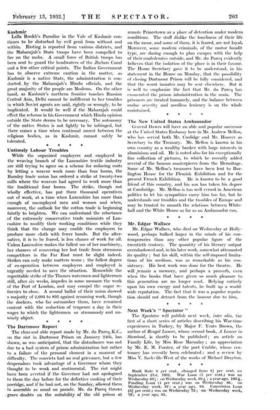Untimely Labour Troubles
While the organized employers and employed in the weaving branch of the Lancashire textile industry are still trying to agree on a scheme for reducing costs by letting a weaver work more than four looms, the Burnley trade union has ordered a strike at twenty-two mills where the weavers had agreed to work more than the traditional four looms. The strike, though not wholly effective, has put three thousand operatives out of work, at a time when Lancashire has more than enough of unemployed men and women and when, moreover, the outlook for the cotton trade is beginning faintly to brighten. We can understand the reluctance of the extremely conservative trade unionists of Lan- cashire to modify their working conditions while they :think that the -change may enable the employers to produce more cloth with fewer hands. But the alter- native, it is to be feared, is less chance of work for all. Unless Lancashire makes the fullest use of her machinery, her chances of recovering her lost trade from strenuous competitors in the Far East must be slight indeed. Strikes can only make matters worse ; the fullest degree of co-operation between employers and employed is urgently needed to save the situation. Meanwhile the regrettable strike of the Thames watermen and lightermen still, after six weeks, impedes in some measure the work of the Port of London, and may compel the sugar re. fineries to close. A second ballot of their union showed a majority of 2,094 to 895 against resuming work, though the dockers; who far outnumber them, have remained content with the reduction of tenpence a day in their wages to which the lightermen so strenuously and un-
wisely object. * * * *






































 Previous page
Previous page